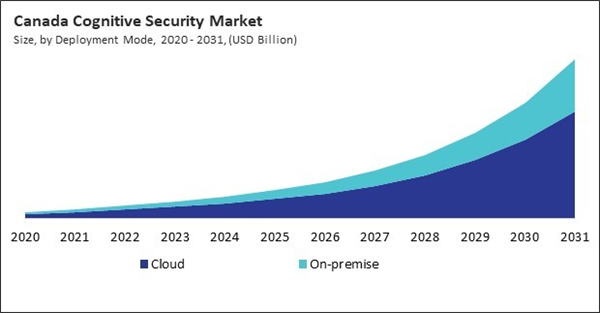The US market dominated the North America Cognitive Security Market by country in 2023, and is expected to continue to be a dominant market till 2031; thereby, achieving a market value of $28.30 billion by 2031. The Canada market is expected to witness a CAGR of 32.9% during 2024-2031. Additionally, the Mexico market would register a CAGR of 31.9% during 2024-2031.
Cognitive security is an advanced cybersecurity approach that leverages artificial intelligence (AI), machine learning (ML), deep learning, and behavioral analytics to detect, analyze, and mitigate cyber threats in real-time. Unlike traditional cybersecurity methods that rely on static rules, predefined signatures, and manual threat identification, cognitive security systems are designed to learn, adapt, and predict cyber threats dynamically. These solutions provide proactive defense mechanisms by utilizing AI-powered intelligence, ensuring organizations respond swiftly to evolving cyber threats, zero-day attacks, and sophisticated hacking techniques.
At its core, cognitive security mimics human cognitive functions by analyzing large volumes of security data, identifying anomalies, and making intelligent decisions based on real-time insights. It detects potential threats before they escalate by processing structured and unstructured data from a variety of sources, such as network logs, threat intelligence feeds, user behavior patterns, and system activities. By continuously learning from past incidents, cognitive security systems enhance their ability to differentiate between normal activities and suspicious or malicious behaviors.
The Mexican banking and financial sector is witnessing a growing demand for cognitive security as cybercriminals increasingly target digital banking platforms, fintech companies, and financial institutions. The National Banking and Securities Commission (CNBV) has enforced strict cybersecurity regulations, requiring financial entities to implement AI-based fraud detection, automated risk assessment, and anomaly detection mechanisms to prevent cyber fraud. With Mexico’s financial industry undergoing rapid digital transformation, initiatives such as the Open Banking framework are pushing banks to adopt real-time threat intelligence and AI-powered cybersecurity to safeguard customer data. Therefore, with governments and enterprises prioritizing cybersecurity resilience, the market is poised for significant growth in the coming years.
List of Key Companies Profiled
- Trend Micro, Inc.
- IBM Corporation
- DXC Technology Company
- Fortinet, Inc.
- SentinelOne, Inc.
- Check Point Software Technologies Ltd.
- Cisco Systems, Inc.
- Amazon Web Services, Inc. (Amazon.com, Inc.)
- Palo Alto Networks
- McAfee Corp.
Market Report Segmentation
By Deployment Mode
- Cloud
- On-premise
By Component
- Solution
- Real-Time Security Analytics & Visualization Platform
- Unified Log Manager & Data Catalog
- Biometric Recognition
- Other Solution Type
- Services
- Managed Service
- Professional Service
By Enterprise Size
- Large Enterprises
- Small & Medium-Sized Enterprises (SMEs)
By Application
- Anomaly Detection & Risk Mitigation
- Threat Intelligence
- Automated Compliance Management
- Fraud Detection & Prevention
- Other Application
By
Industry Vertical
- BFSI
- Government & Defense
- IT & Telecom
- Healthcare & Lifesciences
- Retail & eCommerce
- Energy & Utilities
- Manufacturing
- Other Industry Vertical
By Country
- US
- Canada
- Mexico
- Rest of North America
Table of Contents
Companies Mentioned
- Trend Micro, Inc.
- IBM Corporation
- DXC Technology Company
- Fortinet, Inc.
- SentinelOne, Inc.
- Check Point Software Technologies Ltd.
- Cisco Systems, Inc.
- Amazon Web Services, Inc. (Amazon.com, Inc.)
- Palo Alto Networks
- McAfee Corp.









